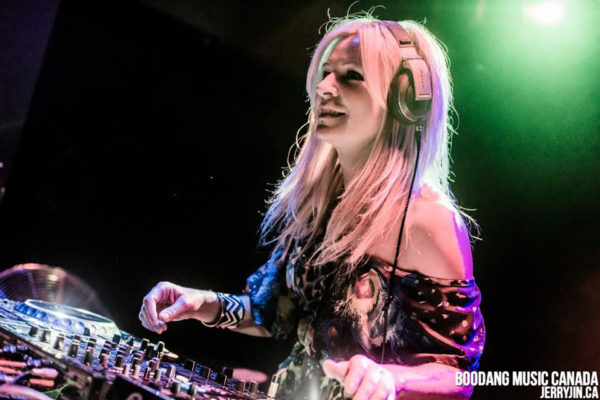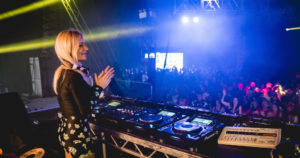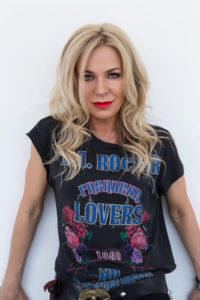Blog: Anne’s hearing loss story

By Carly Sygrove
In January 2020, I met Anne Savage at the British Tinnitus Association Manifesto Roundtable discussions. The event brought together people with tinnitus, researchers, celebrities, politicians, public health institutions and research funders to discuss ways to advance the search for a tinnitus cure.
Anne and I sat opposite each other at one of the two parallel tables. We became acquainted across the table, each striving to communicate in the noisy environment, despite our hearing difficulties. Towards the end of the event, Anne revealed to me that she was feeling tired from trying to listen and participate in the discussions, over the background noise; it was comforting to know I wasn’t the only one.
I was interested in knowing more about how Anne navigates her career as a DJ and continues performing, despite having noise-induced hearing loss and tinnitus.
Anne kindly joined me via video call for an interview where she spoke openly about her tinnitus and hearing loss; her mission to raise awareness of the importance of hearing protection; and her determination to continue making music.
Hi Anne, can you tell me a bit about yourself?
Hi, my name is Anne Savage. I’m a DJ and producer and have been for 27 years now. I’m doing my PHD on Noise Safety in the Dance Music Events Industry; that’s my passion. I’ve got tinnitus, so I’ve got a massive interest in that.
How did you get into DJing?
My family aren’t particularly musical, but I’ve got four older brothers and two older sisters, and they were all into different types of music, and I just picked it up from them. From a very young age, I collected music.
Then when I was 18 and I started going out drinking, I was always the one watching the DJ. From that age, I said, “I want to be a DJ.” It was just something in me. I did play guitar in a band, so I was just passionate about music. I bought turntables and started pestering people to put me on the line-up and it paid off. I got a residency and I got an agent, and it snowballed from there.
Tell me about your hearing loss.
It’s much worse in one ear. Do you know how I can tell?—because my boyfriend snores and if I lie on one side I don’t mind it so much, and then when I turn over, it’s like, ‘Argh, it’s deafening!’
Mainly the high pitch has gone. It’s [the left] ear that’s worse as that’s the one I use to mix with. When I’m mixing, I’ve got to listen to the House sounds—the main sound system—and mix in this ear [cups left ear as though holding a headphone]. It’s the ear with the headphone on that is worse. So, I have to turn it up to try and make the volume the same as the House sounds so I can mix properly.
As the music gets louder, your ears get used to it. So, then you’re turning it up and turning it up, to the point where, say a DJ comes on after me and they haven’t been mixing, they’re like, “Anne, that’s so loud!” You don’t know it’s getting louder and louder.
Do you wear hearing aids?
No, I’ve never tried.
Why haven’t you tried?
I don’t really go to many social situations—I’m either at home or DJing—so I’ve never felt like I’ve had to.
The last time I had my ears tested was about three years ago. They said, “Yeah, you’ve got some hearing loss, but if you’re coping then that’s fine.” …It’s a bit of a lottery who you get to speak to. So, I was just, like, shoved out the door. I felt guilty for even going to speak about it.
How does your hearing loss and tinnitus impact on your life?
From the point of view of my music career, I stopped taking as many gigs because I got really scared that I was going to go completely deaf and I nearly didn’t write the album that I wrote last year. It was horrendous because then I just felt like: if I don’t DJ, who am I?
I went through this hideous phase thinking I just can’t stop DJing. So, now I’m really careful. I don’t stay in a club longer than I have to before I play, and I leave straight afterwards—that’s a shame because I can’t socialise at the clubs with the fans so much.
I avoid going out to restaurants and bars. It’s pointless unless it’s just me and my boyfriend. Even if it’s me and one other couple and there’s any background noise, it’s just embarrassing ‘cos I can’t hear. It’s really isolating because I just give up and I end up saying nothing. If there’s a family get-together it’s a nightmare, I can’t hear anybody. I just feel stupid.
My other pastime is, I race motorbikes. I’ve competed in the Scottish & British Supermoto Championships. But that’s not helping either—when I found out how loud they are. So, I’m really worried about that. I have to wear earplugs there which is dangerous because I can’t hear if someone is coming alongside.
 Can you tell me about your tinnitus?
Can you tell me about your tinnitus?
I used to work in a record shop, and it was before noise regulations and so [the music] was just full blast all day every day. Then DJing at the weekends; I used to go from one gig to another—sometimes I’d do three gigs in a night,
You know when you come out of a club and your ears are ringing and it would go after a couple of days? After about 15 years, it just got more persistent; it got to the stage where the ringing was there all day every day.
What does your tinnitus sound like?
It’s like white noise—the telly when it’s not tuned in properly. (Although, I don’t think that ever happens on tellies anymore!) And then the random [Anne makes a high-pitched noise].
When did you realise the tinnitus was becoming more persistent?
When I did my first degree, in 2011, I was spending a lot more time on my own trying to study… When I’m trying to concentrate [tinnitus] becomes more noticeable and gets louder. I know that stress makes it worse as well. I was like: This is really bad. I did start to panic at that point. It was just like: It’s never gonna go, I’m never gonna hear silence again.
You hear the horror stories, the really sad cases where people have done the worst. Then it’s just a psychological battle, thinking: I can’t let this get the better of me.
Do you have any tinnitus management strategies?
I’ve got my tinnitus playlist on my computer that I have to have on when I’m trying to study.
Mindfulness. I wouldn’t say I meditate… I call it ‘having a word with myself’! And, de-stressing, ‘cos mine just gets worse and worse and I can feel it building and it’s just like, ‘Rargh!’ That’s when I realise: Right, I’ve got to calm down. If my tinnitus is particularly bad, I go outside or I listen to music, just change what I’m doing—that’s how I tend to cope.
I think once you accept that it’s always going to be with you, you do get used to it. I hate it and I wish it would go away, but I’ve learned to live with it.
Do your loved ones understand the challenges that come with hearing loss and tinnitus?
Absolutely. My boyfriend has got [tinnitus] as well, and he’s got hearing loss in one ear, so he’s super supportive. Obviously, my sisters know. My elder brother (who sadly passed away last year) had tinnitus really bad and he had hearing aids. My grandad on my mum’s side had it [tinnitus]. My mum’s the worst at the moment—she struggles on the phone now.
The whole family is a mixture of hearing loss and tinnitus, whether it’s from going through the war, being in the army, listening to music like me… That’s why I’m so passionate about trying to campaign for people to understand the dangers of [not] protecting your hearing.
You are an ambassador for Plug’em—can you tell me a little more about this?
Plug’em is a campaign by the British Tinnitus Association, raising awareness for young people to protect their hearing when they’re out clubbing in nightclubs, bars and festivals. It’s just putting the word out there to wear earplugs and be aware of the volume and the damage that can be done.
When I’m racing motorbikes, I self-sponsor Plug’em on my race leathers and bike. Tinnitus is a massive issue for people in motorsport, so I sponsor the calendar on behalf of Plug’em and raise awareness of wearing earplugs for the spectators and the competitors at the circuits. I have had many people come up to me and talk about their tinnitus since I’ve started raising awareness, and now at some of the meetings a company who make custom-moulded earplugs have a stall to get them fitted at the race tracks all over the country.
What type of earplugs would you recommend?
The word is ‘attenuating’ [sound-reducing while keeping the tonal balance of music and clarity of speech]—that’s what you want to look for when you’re buying earplugs.
Some promoters are giving away foam earplugs and, in a way, they do more harm than good. People try them, they have a bad experience because they can’t hear the music and they just think: Oh, earplugs aren’t for me. And, they never bother again.
Do you regret not protecting your hearing when you were younger?
Yes, I do, massively. The thing is, you never think it’s going to happen to you. You just think you’re invincible when you’re young, and you’re not!
But, it’s never too late. This is what I’m saying to people who’ve got hearing loss or tinnitus: ‘Don’t think it’s pointless closing the door after the horse has bolted—you can prevent it from getting worse.’
What advice would you give to young people going to clubs or gigs, and why should they listen to you?
It’s not just me banging on. Nearly everybody my age who’s spent any amount of time clubbing has got tinnitus that they find really hard to cope with.
Also, my angle on it is the health and safety and prevention, so I would say:
Take into consideration how much you listen with your earphones because it’s the length of time, not just the volume that affects your hearing. So, don’t dance in front of the speakers all night. Take breaks. Do invest in a decent pair of earplugs—attenuating ones—and don’t be embarrassed to wear them. Tinnitus and hearing loss are a lot less cool than wearing earplugs!
What are your plans for the future?
With my PhD, I don’t just want to end there. I really want to raise the standard of music in nightclubs and I want to try and bring attention to why [music] doesn’t have to be that loud. I know everyone loves it loud, but I want people just to think about it: Does it really have to be that loud to enjoy it in venues?
And, for venue owners and operators to be more responsible for the people that come into the club by warning them and also the people that work there. I want them to look after them more. I think the laws will change if enough people shout about it. And that’s why I’m so passionate about telling people to go to their GP because the more people go to their GP, the more it will be one the radar; the more there will be research done.
And, continue to make music safely and just carry on doing what I like doing. I don’t want tinnitus to stop me doing that, and I won’t let it. And, I won’t let my hearing loss stop me—I’m determined to carry on being a musician.
It’s been great to talk with you. Thank you, Anne, for sharing your story.
It’s been brilliant.

